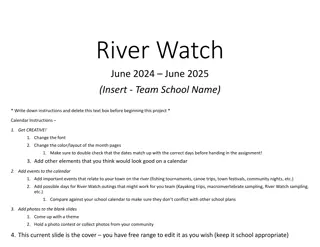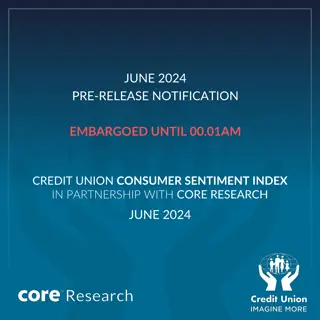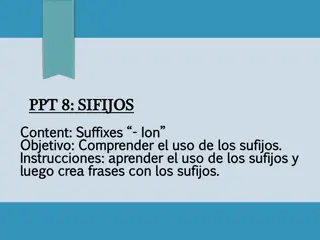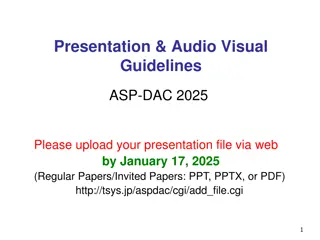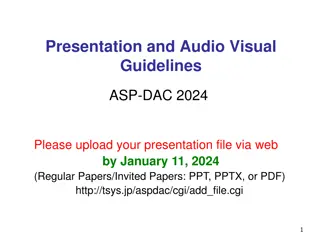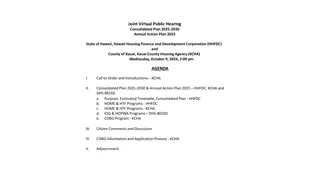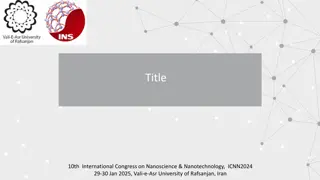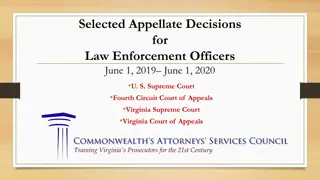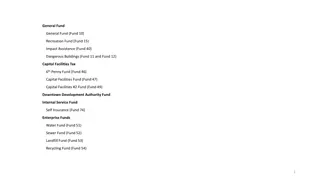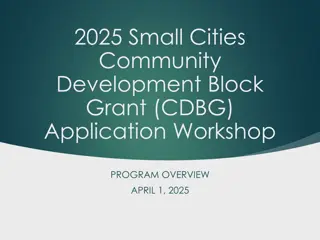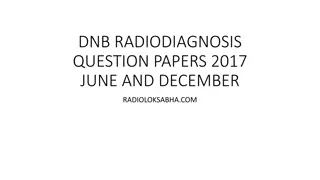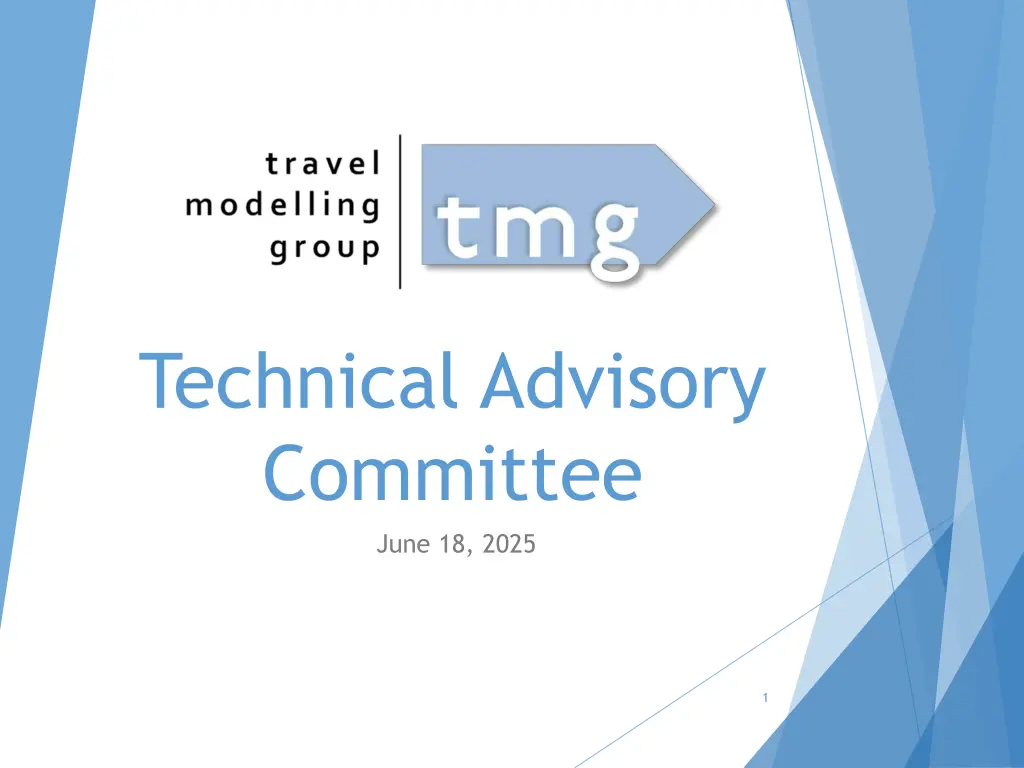
Technical Advisory Committee Update June 2025
Explore the latest updates from the Technical Advisory Committee meeting held in June 2025, including discussions on the 2025-26 work plan, TTS 2022 analysis, and ongoing projects related to transportation modeling. Discover insights on land use inputs, student projects, and more. Stay informed on the developments shaping transportation planning and analysis.
Download Presentation

Please find below an Image/Link to download the presentation.
The content on the website is provided AS IS for your information and personal use only. It may not be sold, licensed, or shared on other websites without obtaining consent from the author. If you encounter any issues during the download, it is possible that the publisher has removed the file from their server.
You are allowed to download the files provided on this website for personal or commercial use, subject to the condition that they are used lawfully. All files are the property of their respective owners.
The content on the website is provided AS IS for your information and personal use only. It may not be sold, licensed, or shared on other websites without obtaining consent from the author.
E N D
Presentation Transcript
Technical Advisory Committee June 18, 2025 1
Meeting Agenda 1. 2025-26 work plan update. 2. TTS 2022 analysis. 3. Land use inputs to travel demand models: a discussion. 4. Other business. 5. Adjournment. 2
2025-26 Work Plan TMG 2025-26 Work Plan No. TASK 1 TTS 2022 Analysis 2 GTAModel V4.3 3 GTAModel V5 4 GTAModel V4 maintenance 5 TMG Network Modelling Toolbox Development & Maintenance 6 XTMF: Upgrades/ Maintenance & V2.0 Development 7 Documentation of TMG products 8 Outreach & Training (3 workshops) 9 Meetings: TMGSC (2) & TMGTAC (6) TMG Staff Average Weekly Time Allocation (Days)2 2024-25 Apr 2.5 7.5 1 1 1 1 1 Days Allocated Total1 May 2.5 7.5 1 1 1 1 1 June 2.5 7.5 1 1 1 1 1 W1 TAC July Aug Sep Oct Nov Dec Jan Feb Mar % 30 222 276 48 48 48 48 720 4.2% 30.8% 38.3% 6.7% 6.7% 6.7% 6.7% Total 10 1 1 1 1 1 10 1 1 1 1 1 10 1 1 1 1 1 1 10 1 1 1 1 W2 SC 1 10 1 1 1 1 1 10 1 1 1 1 W3 11 1 1 1 1 11 1 1 1 1 11 1 1 1 1 W4 SC TAC TAC TAC TAC TAC TAC 15 15 15 15 15 15 15 15 15 15 15 15 15.0 2022 GGH network (Henry). 2022 transit fares (Henry). V4.3 projects. 3
V4.3 Projects Underway Volume-delay function investigation: Collaborating with Metrolinx. Summer student (Justin Fang) working with Henry. Vehicle-for-hire modelling: Collaborating with Toronto Transportation Services. New carpool model. VfH as first/last mile transit access/egress mode. Continuing development of PTC simulation model in GTAModel. One each of postdoc, PhD student, MEng student & undergrad working with TMG staff. Bicycle route choice modelling. Continuing to develop a bicycle route choice model. Collaborating with Profs. Saxe & Chan. Postdoc working with TMG staff. Transit reliability modelling in Emme. Collaborating with Prof. Shalaby & Visiting Prof. Babazadeh Two postdocs working on this. 4
Other Related Student Projects A number of student- & postdoc-based projects are underway in support of GTAModel V4.3 / V5.0: GO Bus modelling (Grace Zhang). ILUTE/2 (Charlie Martinez, Billie Zhang, Mwendwa Kiko, ) Analysis of GO expansion benefits (Richard Lee). 5
TTS 2022 Analysis (1) First round of analysis is complete. Available on the TMG website: CTRF presentation: Gao, Y., Y. Liu and E.J. Miller, Pre/Post Pandemic Travel Behaviour in the Greater Golden Horseshoe , presented at the 60th Annual Conference of the Canadian Transportation Research Forum, Ottawa: May 25-28, 2025. TMG technical report: Gao, Y., Y. Lin and E.J. Miller, Changing Travel Behaviour in the GGH: Analysis of TTS 2022, Toronto: Travel Modelling Group, University of Toronto, June 10, 2025, 74 pages. Continuing to look at WaH/WfH using TTS and THATS data, including some exploratory modelling. 6
TTS 2022 Analysis (2): A Few Findings As expected, instrument bias & non-respondent bias are detected & will need adjusting for when modelling trip/activity generation (at a minimum). Despite weightings, concerns about sample bias exist. Need to compare to census data. Difficult to differentiate between possible survey biases & actual changes from 2016. Transit under-count is a serious concern. WaH/WfH effects are quite evident. Largely appear to be as expected. Affects overall daily activity patterns, not just commuting. Some indications of 2022-23 changes. Will continue to investigate. 7
TTS 2022 Analysis (3): Modelling Implications Re-weighting is a possibility, but has issues as well: Multiple versions of TTS. Re-weighting is a challenging task. Less reliance on TTS for model development: Census data for population & employment synthesis. More extensive use of road & transit count data for calibration. Will investigate a multi-year estimation process (at a minimum 2016 + 2022/23). 8
Land Use Forecasts: Data & Models Problem definition. 1. Options. 2. General discussion: needs, issues, options. 3. 9
Land Use: Problem Definition All regional travel demand models require exogenous inputs of projected population and employment by TAZ. These come from a variety of sources & methods, depending on the agency. Inconsistencies in forecast assumptions & methods make comparing model results from different agencies difficult to compare. Significant duplication of effort across agencies in preparing these data. All regional travel demand models take the aggregate TAZ pop/emp forecasts and synthesize the disaggregate population agents (persons; households) and (to a much lessor extent) jobs needed for input into the activity/travel model system. Again, synthesis methods vary across agencies (Popsyn 3; MetroPop; etc.). 10
Land Use: A Few Options UofT is reviving its ILUTE integrated urban modelling research program. Not a short run solution. Some possibilities: Developing a common pop/emp forecasting system. Standardizing on a common population synthesizer. Developing a common database of land use forecasts/assumptions for joint use. E.g., a TMG or DMG activity? Has been discussed in the past. 11
Land Use: General Discussion Agency issues, needs. Current methods. Data needed; data available. Barriers to collaboration. Suggested ways forward. 12
2025-26 Meeting Schedule TMG Technical Advisory Committee Meetings (10:00-12:00): September 3, 2025 November 5, 2025 January 7, 2026 February 4, 2026 TMG Workshops (10:00-12:00): June 25, 2025 Cancelled October 29, 2025 December 3, 2025 March 25, 2026 TMG Steering Committee Meetings (10:00-12:00): October 1, 2025 March 4, 2026 All meetings online on MS Teams. 14






